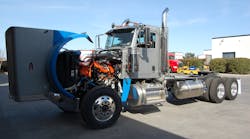The key to making natural gas work in trucking operations is to view it as a “long-term play,” according to a bevy of experts gathered by Peterbilt Motors Co. for its Natural Gas Leadership 2012 event held this week at its headquarters in Denton, TX, and at the Texas Motor Speedway.
[To view photos of Peterbilt’s event, click here.]
For example, Kelly Mills, western U.S. territory sales manager for natural gas engine maker Westport Innovations, pointed out that fleets spec’ing his company’s 15L liquefied natural gas (LNG) fired product are going to lose money during the first year or two of their truck ownership cycle – largely because of the $80,000 extra a Class 8 heavy-duty natural gas truck costs versus a traditional diesel-powered model.
“But that all changes in year three and beyond of the ownership cycle,” he stressed, for that’s when the fuel price differential between natural gas and diesel fuel begins to fall to the bottom line.
Right now, natural gas costs approximately $2.50 per diesel gallon equivalent (DGE) compared to diesel fuel, which is now averaging $4 per gallon in the U.S. “That equates to a fuel savings of $20,000 to $40,000 per year, depending on your annual truck mileage,” he said.
Looking long term is also critical in terms of gauging the cost of future fuel supply as well, noted David Jaskolski, senior account manager for Southeast LNG, a transportation-focused division of natural gas supplier AGL Resources.
“It’s not just what the equivalent gallon price of natural gas is on any given day – it’s the spread between natural gas and oil futures that’s important,” he explained.
Oil is traded on the global market and is thus subject to many different pricing pressures, not all of them supply-and-demand related, Jaskolski pointed out. “However, the bulk of the natural gas U.S. transportation would rely upon is in North America,” he stressed, with 87% of it coming from the U.S. and another 12% from Canada.
That “stranded” domestic supply means natural gas prices are much less volatile, and with a current projected 100-year supply of natural gas in the U.S. alone, would be able to sustain a significant pricing spread that would benefit users when compared to oil.
“Even if significant exports of LNG were to occur from the U.S. to the world market, it would not affect that [pricing] spread,” he said.



